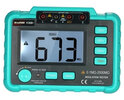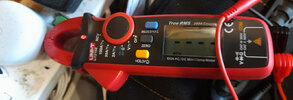I reached out to my LABC to get an idea of the likely inspection fees, and once they caught wind that I didn't have formal qualifications, they flat out refused to deal with me ("I'm afraid it's a non starter").
I will be doing testing throughout, and will probably invest a few hundred quid into testing equipment, but something like a multi-function tester would be an unjustifiable expense for me. That will still give me, say, 90% certainty that there are no faults.
Now I am confused, to start you say LABC are to inspect and test, they your inspecting and testing? I now also have the problem with lack of test equipment.
The insulation tester

and clamp on meter

are cheap enough at £35 each, lucky also have my old insulation tester that also does low ohms, but loop impedance tester and RCD tester are darn expensive, I can borrow them, but then still need calibration certificates, so likely best idea is to hire. It seems between £50 to £60 per week, and a plug in tester with loop

costs around £60 so hiring does seem the cheap option, the plug in testers do not go low enough to test a ring final.
I did have a problem getting the LABC inspector to allow me to test, they wanted me to pay for a third party tester, and my son asked the question (We both have our C&G 2391) if my dad passes it, and the third party tester fails it what will you do, accept the one with the higher qualifications is normal, and my dad has a degree. Only then did the LABC inspector say he would accept an installation certificate signed by me, not my son, which is not really what we wanted, as son had the insurance not me. So he looked at the test equipment laid out and my statement that I was hardly likely to put my parents in danger, and allowed me to sign.
Some 5 - 10 years latter we came to sell the house, and at first could not find the paperwork, so applied to the LABC for copies, told it would take 4 months and would cost how ever long it took council worker to find documents, in other word go away and don't be silly.
So one asks what was the point? So much for traceable records, we did in the end find the documents, and as I read them I realised there was no link between the completion certificate and the EIC, I could clearly just write out a new one covering what ever I wanted. And the three certificates said very little as to what superseded what, so one had no idea who was responsible for the work, kitchen, CU change, and wet rooms all had two sets of documents with nothing to say who did what.
The only reason I informed the LABC was we thought the builders had already done it. Other wise I would have not bothered. But you can't untell them.




